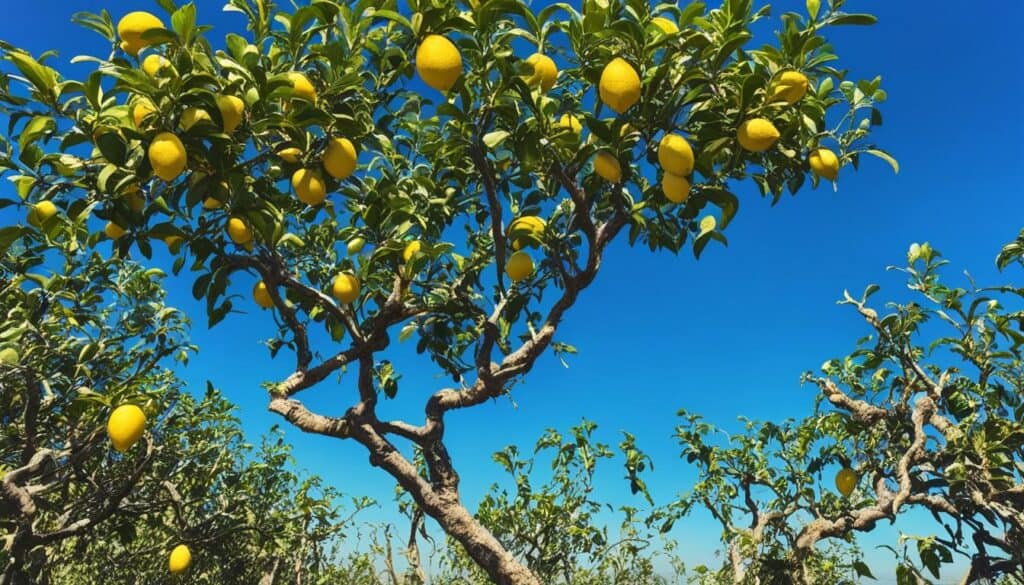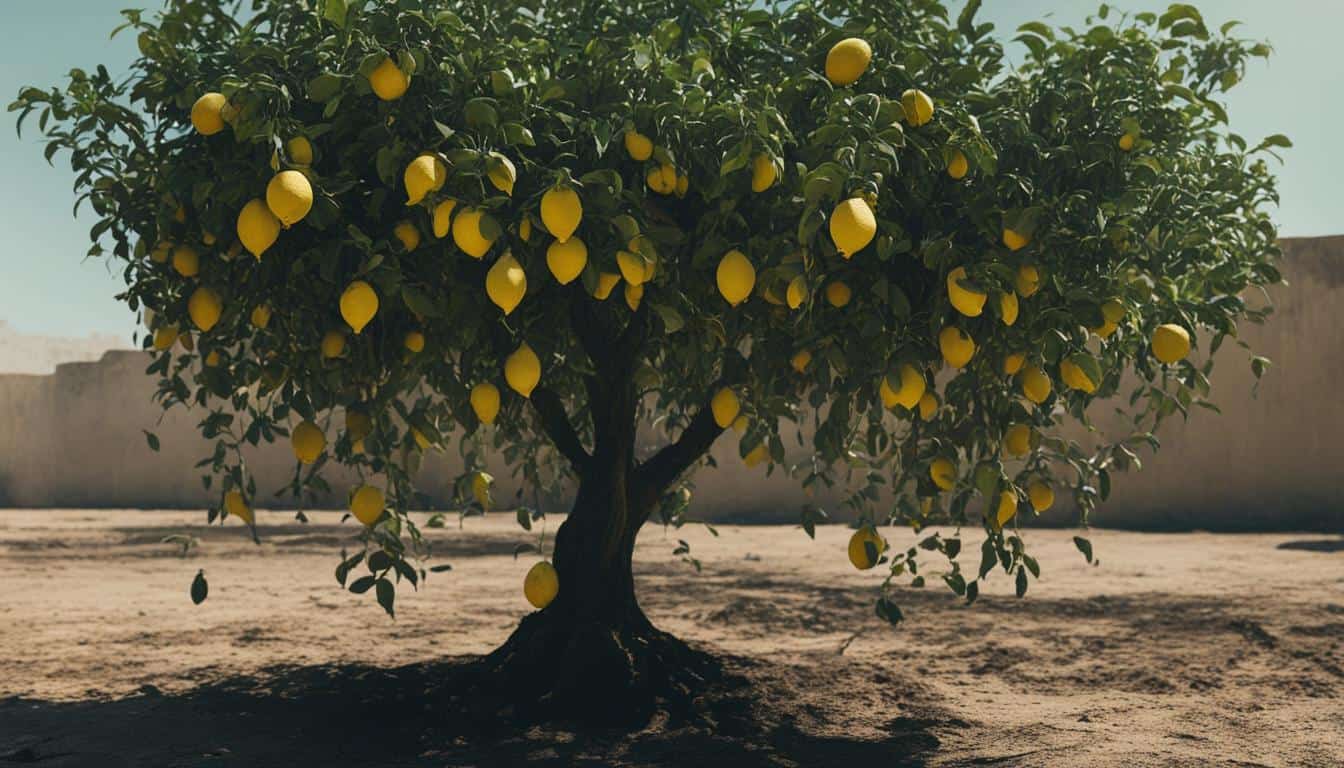Growing a lemon tree can be an exciting and rewarding experience. However, it can also be disheartening when your lemon tree fails to produce any fruit. If you find yourself wondering why your lemon tree is not fruiting, you’re not alone. There are several reasons why this might be happening, and in this article, I will explore the common causes and provide solutions to help you get your lemon tree back on track.
Key Takeaways:
- Incorrect cultivation, lack of nutrients, insufficient water, bad rootstock, or the tree not being old enough can prevent fruiting on lemon trees.
- Blossom drop, where newly forming fruits fall off, can be caused by factors such as excess fruits, too much water, low nutrients, or exposure to cold.
- Creating an optimal environment that includes proper placement, adequate watering, fertilization, and disease and pest control can help encourage fruit production on lemon trees.
- It’s important to be patient, as lemon tree fruiting typically occurs at three to five years old.
- Providing the tree with proper care and addressing issues individually can improve fruiting in subsequent years.
Reasons for No Fruit on Lemon Trees
The lack of fruit on lemon trees can be attributed to various factors. One common reason is a lack of blooms, as flowers lead to fruit production. This can be caused by incorrect cultivation practices, such as improper placement of the tree or inadequate care. Insufficient nutrients, water, and cold exposure can also prevent fruiting. It is important to identify and address these issues to encourage fruit production on lemon trees.
One of the main reasons why lemon trees may not produce fruit is the lack of blooms. Flowers are essential for fruit production as they develop into the lemons we harvest. If your lemon tree is not blooming, it may be due to incorrect cultivation practices or insufficient care. Improper placement of the tree, such as planting it in a shady area, can limit its access to sunlight and hinder flower formation. Inadequate care, including irregular watering or poor soil quality, can also contribute to a lack of blooms.
Another factor that can prevent fruiting is the insufficient availability of nutrients and water. Lemon trees require proper nutrition to produce healthy and abundant fruit. If the tree is not receiving enough essential nutrients, such as nitrogen, phosphorus, and potassium, its ability to produce fruit may be compromised. Similarly, inadequate watering can lead to stress and impact the tree’s ability to develop fruit. Consistent and adequate water supply, especially during dry periods, is crucial for the lemon tree to thrive and bear fruit.
Additionally, exposure to cold temperatures can affect fruiting. Lemon trees are sensitive to frost and cold weather, and extended periods of low temperatures can damage or kill flowers and small fruit. Protecting the tree from cold snaps and providing proper insulation during winter months is vital to ensure successful fruit production.
“A lack of blooms, inadequate nutrients and water, and cold exposure are common factors that can affect fruit production on lemon trees.”
To encourage fruit production on lemon trees, it is essential to address these issues. Proper placement of the tree in a sunny location, ensuring adequate care and nutrition, and protecting the tree from cold temperatures are all crucial steps to promote fruiting. By providing the necessary conditions and care, you can increase the chances of your lemon tree producing a bountiful harvest.
| Reasons for No Fruit on Lemon Trees | Solutions |
|---|---|
| Lack of blooms | – Proper tree placement in a sunny area – Ensure adequate care and soil quality – Encourage pollination by attracting bees and other pollinators |
| Insufficient nutrients | – Use a citrus-specific fertilizer rich in nitrogen, phosphorus, and potassium – Apply fertilizer in spring and follow recommended dosage – Regularly monitor and adjust soil pH levels if necessary |
| Inadequate watering | – Provide consistent and deep watering, especially during dry periods – Avoid overwatering or underwatering – Use mulch to retain soil moisture |
| Cold exposure | – Protect the tree from frost and cold weather – Cover the tree during cold snaps or move potted trees indoors – Use frost blankets or other insulation methods |
How Can I Get My Lemon Tree to Bear Fruit?
To encourage fruit production on lemon trees, it is essential to create an optimal environment for the tree. Here are some essential steps:
1. Plant in a Warm Location with Good Sun Exposure
Choose a warm location for your lemon tree that receives at least six hours of continuous sun per day. This is crucial for the tree’s photosynthesis process and fruit development.
2. Provide Adequate Watering and Fertilization
Ensure your lemon tree receives adequate water throughout the year. Deep watering during the fall and regular irrigation in spring and summer are essential. Additionally, use a citrus-specific fertilizer high in potash in early spring to promote blooming and fruiting.
3. Prune Dead Wood and Problem Branches
Pruning is important for maintaining the health and productivity of your lemon tree. Focus on removing dead wood and problem branches, but keep pruning to a minimum. Over-pruning can hinder fruit production.
4. Implement Disease and Pest Control Measures
To protect your lemon tree from diseases and pests, take appropriate control measures. Regularly inspect the tree for signs of disease or infestation and apply suitable treatments as needed to keep it healthy and productive.
By following these steps and providing the necessary care, you can increase the chances of your lemon tree bearing fruit. However, remember that lemon tree fruiting typically occurs at three to five years old, so be patient and persistent in your efforts.
| Steps to Encourage Fruit Production on Lemon Trees |
|---|
| Plant in a warm location with good sun exposure |
| Ensure adequate watering and fertilization |
| Prune dead wood and problem branches |
| Implement disease and pest control measures |
How to Encourage Fruit on Lemon Trees
Providing the necessary care to lemon trees is instrumental in encouraging fruit production. There are several key factors to consider when aiming to boost fruit production on lemon trees:
- Deep and frequent watering: In the fall, it is crucial to provide deep and frequent watering to ensure the tree receives adequate hydration. As winter approaches, reduce the frequency of watering, allowing the tree to enter its dormant phase. Once spring arrives, resume deep watering and continue this practice throughout the summer. This consistent watering regimen helps support healthy fruit development.
- Fertilization: In the spring, fertilize the lemon tree using an appropriate citrus fertilizer. Look for a fertilizer that contains phosphorus, as this nutrient plays a vital role in blooming and fruiting stimulation. Apply the fertilizer according to the manufacturer’s instructions to ensure proper dosage and avoid over-fertilization.
- Pruning: Pruning should only be done when necessary, primarily focusing on removing dead wood and problem branches. Avoid excessive pruning, as this can potentially reduce fruiting. Regularly inspect the tree for any signs of disease or pest infestation and promptly address these issues to maintain the tree’s overall health.
- Disease and insect control measures: Implementing effective disease and insect control measures is crucial for protecting the tree’s health and promoting fruiting. Regularly monitor the tree for any signs of pests or diseases and take appropriate action. Consult with a local gardening expert or arborist for guidance on suitable treatments or preventative measures specific to your region.
To further assist you in understanding the importance of these practices, here is a table summarizing the key steps to encourage fruit production:
| Steps to Encourage Fruit on Lemon Trees |
|---|
| Deep and frequent watering in fall, reduced watering in winter, and deep watering in spring and summer |
| Fertilize in spring with a citrus fertilizer containing phosphorus |
| Prune when necessary, removing dead wood and problem branches |
| Implement disease and insect control measures |
By following these guidelines and providing the necessary care, you can increase the chances of your lemon tree producing a bountiful harvest of delicious citrus fruits. Remember, patience is key, as it may take several growing seasons for your lemon tree to reach its full fruiting potential.

No Fruit on Lemon Tree After Cultural Attempts
If you have made cultural attempts to encourage fruit production on your lemon tree without success, it may be due to a poor rootstock. Dwarf rootstocks are known to produce the best fruit and bear more quickly. Sometimes, it may take a year of dedicated cultivation for fruit to appear, especially if the tree has been neglected. However, providing your lemon tree with proper care and attention can help improve fruiting in subsequent years.
Tips for Improving Fruit Production
- Watering: Ensure your lemon tree receives regular and deep watering, especially during the growing season. However, be cautious not to overwater, as this can lead to root rot and hinder fruit production.
- Fertilizing: Use a citrus-specific fertilizer high in potash to promote blooming and fruiting. Apply the fertilizer in early spring and follow the recommended dosage.
- Disease and Pest Control: Implement proper disease and pest control measures to protect the health of your lemon tree. Regularly inspect the leaves, branches, and fruit for any signs of infestation or disease and take appropriate action.
By providing your lemon tree with the necessary care, you can increase the chances of fruit production in the future. Remember to be patient and persistent, as it may take some time for your tree to fully recover and start bearing fruit again.

Common Issues with Lemon Tree Fruit Production
When it comes to lemon tree fruit production, there are several common issues that can hinder the process. Addressing these issues individually is crucial to ensure that your lemon tree receives proper care, sufficient nutrients, and optimal growing conditions to promote fruit production.
Poor Watering Practices
One of the main factors that can contribute to a lemon tree not producing fruit is poor watering practices. Overwatering or underwatering the tree can disrupt its nutrient absorption and hinder fruit production. It is important to find the right balance and provide consistent, appropriate watering based on the tree’s needs and the climate it is in.
Cultivating Practices
The way you cultivate and care for your lemon tree can also impact its ability to bear fruit. Improper pruning, excessive fertilizer application, and neglecting to address pest and disease issues can all affect fruit production. It is essential to follow proper cultivation practices and provide regular maintenance to ensure the health and vitality of your lemon tree.
Incorrect Temperature or Insufficient Light
Temperature and light play crucial roles in the fruiting process of lemon trees. Inadequate sunlight exposure or exposure to extreme temperatures can hinder fruit production. Lemon trees thrive in warm, sunny environments and require a minimum of six hours of direct sunlight daily to produce fruit.
Lack of Nutrients in the Soil
Another common issue that can affect lemon tree fruit production is a lack of nutrients in the soil. Nutrient deficiencies, particularly phosphorus and potassium, can inhibit fruiting. It is important to ensure that the soil is properly fertilized with a balanced citrus-specific fertilizer to provide the necessary nutrients for fruit development.
Disease or Pest Infestation
Diseases and pests can significantly impact the health and productivity of lemon trees. Common citrus diseases, such as citrus canker or citrus greening, can affect fruit production. Additionally, pests like aphids, scales, or mites can cause damage to the tree and inhibit fruiting. Implementing proper disease and pest control measures is essential to maintain the overall well-being of your lemon tree.
Bad Rootstock
The rootstock on which your lemon tree is grafted can also impact its fruit production. A poor rootstock can result in decreased vigor and lower fruiting capacity. Choosing the right rootstock, preferably a dwarf variety, can optimize fruit production and improve the overall performance of your lemon tree.
By addressing these common issues related to lemon tree fruit production, you can ensure that your tree is well-equipped to produce an abundant harvest of delicious lemons. Providing proper care, maintaining a balanced environment, and addressing any potential problems promptly will help maximize the fruiting potential of your lemon tree.

Tips for Growing Lemon Trees
Growing lemon trees successfully requires attention to detail and proper care.
When looking to start your lemon tree journey, it is recommended to purchase older, more established trees. These trees often bear fruit faster compared to lemon trees grown from seeds, which can take longer or may not produce fruit at all.
Before getting started, it is important to check the age of the tree. Lemon tree fruiting typically occurs at three to five years old, so purchasing a tree that has already reached this age will help you enjoy the fruits of your labor sooner.
Once you have your lemon tree, providing appropriate watering, fertilization, and temperature conditions are crucial for its growth and fruit production. Be sure to give your lemon tree regular deep watering during fall, followed by reduced watering in winter. In spring and summer, resume deep watering while ensuring the soil is well-drained to avoid waterlogging.
A balanced citrus-specific fertilizer, high in potash, should be applied in early spring to promote blooming and fruiting. This will provide the necessary nutrients for your lemon tree to thrive and bear fruit.
Pro tip: Keep an eye on pests and diseases that can hinder fruit production. Implementing preventive measures and appropriate pest control methods will help ensure the health and productivity of your lemon tree.
“The love of gardening is a seed once sown that never dies.” – Gertrude Jekyll

Essential Care Checklist for Lemon Trees
| Aspect | Action |
|---|---|
| Sunlight | Place the lemon tree in a warm location that receives at least six hours of continuous sun per day. |
| Watering | Provide deep watering during the fall and regular irrigation in spring and summer. |
| Fertilization | Apply a citrus-specific fertilizer high in potash in early spring. |
| Pruning | Limit pruning to removing dead wood and problem branches. |
| Pest Control | Implement necessary measures for disease and pest control. |
Overcoming Challenges in Lemon Tree Fruit Production
When it comes to growing lemon trees, dealing with challenges in fruit production can be disheartening.
One common issue is overwatering. While lemon trees need regular watering, excessive moisture can lead to root rot and hinder fruit production. To overcome this challenge, it’s important to ensure proper drainage and water the tree only when the top inch of soil feels dry.
Pests are another obstacle in lemon tree fruit production. Common pests that affect lemon trees include aphids, scale insects, and citrus leaf miners. These pests can damage the tree and hinder fruit development. To address this challenge, implement regular pest control measures such as using organic insecticides or introducing beneficial insects like ladybugs.
Temperature fluctuations can also impact fruit production. Lemon trees thrive in warm weather, and cold temperatures can inhibit fruiting. If you live in an area with colder climates, consider growing lemon trees in containers that can be moved indoors during the winter months.
Poor soil conditions can be a significant barrier to lemon tree fruit production. Soil that lacks essential nutrients can result in stunted growth and limited fruiting. To overcome this challenge, amend the soil with organic matter such as compost or well-rotted manure. This will improve soil fertility and provide the necessary nutrients for healthy fruit development.
Inadequate pollination can also contribute to a lack of fruit on lemon trees. Bees and other pollinators play a crucial role in pollinating lemon flowers. To enhance pollination, create a pollinator-friendly environment by planting flowers that attract bees and providing a water source.
Remember, addressing these challenges is key to improving fruit production in lemon trees. By ensuring proper watering and drainage, implementing pest control measures, protecting against temperature fluctuations, enriching the soil, and promoting pollination, you can overcome these obstacles and enjoy the bountiful harvest of fresh, tangy lemons from your tree.

Tips for Overcoming Challenges in Lemon Tree Fruit Production:
- Monitor and adjust watering practices to prevent overwatering or underwatering.
- Implement pest control measures to deter common pests.
- Protect lemon trees from extreme temperature drops by providing shelter or moving them indoors during winter.
- Improve soil fertility by adding organic matter.
- Create a pollinator-friendly environment to enhance pollination.
Conclusion
Growing a lemon tree can be a rewarding experience, but it can also be disappointing when your tree fails to produce fruit. However, don’t lose hope! By addressing common issues such as incorrect cultivation practices, nutrient deficiencies, water shortage, and choosing the right rootstock, you can increase the chances of your lemon tree thriving and bearing fruit.
Remember, lemon tree fruiting typically takes some time, usually around three to five years. So, be patient and continue providing the necessary care and attention to your tree. Ensure it receives adequate sunlight, water, and nutrients, and protect it from diseases and pests. With persistence and proper care, your lemon tree will hopefully reward you with a bountiful harvest of delicious lemons.
So, if your lemon tree is not producing fruit, don’t despair. Take the time to assess the possible reasons for its fruitlessness, make the necessary adjustments, and provide the optimal growing conditions. With a little effort, you can turn your non-fruiting lemon tree into a fruitful delight that will enhance the beauty of your garden and provide you with delicious, homegrown lemons.
FAQ
Why is my lemon tree not fruiting?
There can be several reasons for no fruit on lemon trees, including incorrect cultivation, lack of nutrients, insufficient water, bad rootstock, or the tree not being old enough. Blossom drop, where newly forming fruits fall off, can also be a common problem due to factors such as excess fruits, too much water, low nutrients, or exposure to cold.
What are the reasons for no fruit on lemon trees?
Some reasons for no fruit on lemon trees include incorrect cultivation practices, lack of blooms, inadequate care, insufficient nutrients, water, or cold exposure.
How can I get my lemon tree to bear fruit?
To encourage fruit production on lemon trees, it is essential to create an optimal environment. This includes planting the tree in a warm location with good sun exposure, proper watering, adequate fertilization, minimal pruning, and implementing disease and pest control measures.
How to encourage fruit on lemon trees?
Providing the necessary care, such as deep watering in fall, regular irrigation in spring and summer, citrus-specific fertilization, minimal pruning, and disease and pest control can help encourage fruit production on lemon trees.
What if there is no fruit on lemon tree after cultural attempts?
If cultural attempts to encourage fruit production on a lemon tree have been unsuccessful, it may be due to a poor rootstock. It is recommended to check the tree’s age, provide proper care, and be patient for fruit production in subsequent years.
What are the common issues with lemon tree fruit production?
Several factors can hinder lemon tree fruit production, including poor watering practices, incorrect cultivation, temperature fluctuations, insufficient light, lack of nutrients in the soil, disease or pest infestation, and bad rootstock.
What are the tips for growing lemon trees?
Growing lemon trees successfully requires attention to detail and proper care. It is recommended to purchase older, more established trees, check the tree’s age, provide appropriate watering, fertilization, and temperature conditions, and pay attention to pests and diseases.
How can I overcome challenges in lemon tree fruit production?
When facing challenges in lemon tree fruit production, it is important to address specific issues causing the lack of fruit. This includes ensuring proper watering, fertilization, pest control, optimal growing conditions, and addressing factors like overwatering, pests, temperature fluctuations, poor soil conditions, and inadequate pollination.
Why is my lemon tree not producing fruit?
The lack of fruit on lemon trees can be attributed to various factors, including poor watering practices, cultivating practices, incorrect temperature, insufficient light, lack of nutrients in the soil, disease or pest infestation, and bad rootstock. Providing the tree with proper care and optimal growing conditions can help promote fruit production.





Leave a Reply